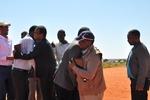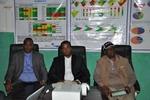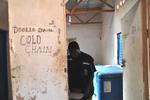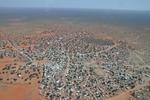Ethiopia Marks 365 Days without Polio
Wardher. 6 January 2015. Since 5 January 2014 no new cases of wild polio virus have been reported from the Somali region of Ethiopia. Dr Pierre M’Pele-Kilebou, WHO Representative to Ethiopia, and Dr Omar Mohammed Farah, Somali Regional Health Bureau Head, visited Wardher town in Doollo Zone, Somali region, on 5 January 2015 to congratulate the Zonal Administration and WHO/UNICEF Operations Base staff for their persistent efforts to ensure that every last child gets vaccinated against this paralyzing disease. The high level delegation acknowledged the excellent collaboration with the Polio Partners Group in Ethiopia to kick polio out of the country and the Horn of Africa.
Until August 2013, when the first case of wild poliovirus was confirmed from the Somali region, Ethiopia had been polio-free since 2008. Ethiopia’s fast and aggressive response together with immunization partners helped to halt the spread of the disease, but intensified efforts must continue as the virus continues to circulate in neighbouring Somalia.
Since June 2013, 12 rounds of polio immunization campaigns have been conducted in addition to on-going border vaccination along the border with Somalia. Over 90% of the population in Doollo Zone are nomads, many living in hard to reach areas. Innovative approaches, such as community mobilization through clan and religious leaders and women groups, as well as vaccination teams at water points, have been proven as essential strategies for reaching the highly mobile population.
“We usually move and follow where the clouds and the rain moves, therefore, unless your health programmes and polio campaigns move also with the clouds and rain as we do, you will never reach us and our children will not get the polio vaccination.” - Parent of a nomadic child affected with polio in Doollo Zone, Somali Region of Ethiopia.
WHO, UNICEF and Médecins Sans Frontières (MSF) renewed their commitment in Wardher to work together with the regional and federal governments to kick polio out of Somali region, Ethiopia and the Horn of Africa. In 2015 intensified efforts will be targeted at strengthening routine immunization, surveillance and health systems in Doollo Zone to sustain the gains achieved in 2014. Dr Pierre M’Pele-Kilebou encouraged the WHO, UNICEF and MSF staff to carry on working together with the Zonal Administration: “One year without polio is a great achievement, but we must continue working as a family to kick polio out of our family."
WHO and UNICEF established an Operations Base in Wardher in August 2014 to bring together the needed technical assistance to support polio interventions in the Doollo Zone, mainly through supplementary immunization activities (SIAs), community based surveillance, capacity building and mobile vaccination teams to reach every child in the pastorialist community.
Poliomyelitis (polio) is a highly infectious viral disease, which mainly affects young children under five years of age. It invades the nervous system, and can cause total paralysis in a matter of hours. One in 200 cases of polio leads to irreversible paralysis. Among those paralysed, 5 to 10% die when their breathing muscles become immobilized. There is no cure for polio, but it can be prevented through a cheap, effective and easily administered oral polio vaccine (OPV).







